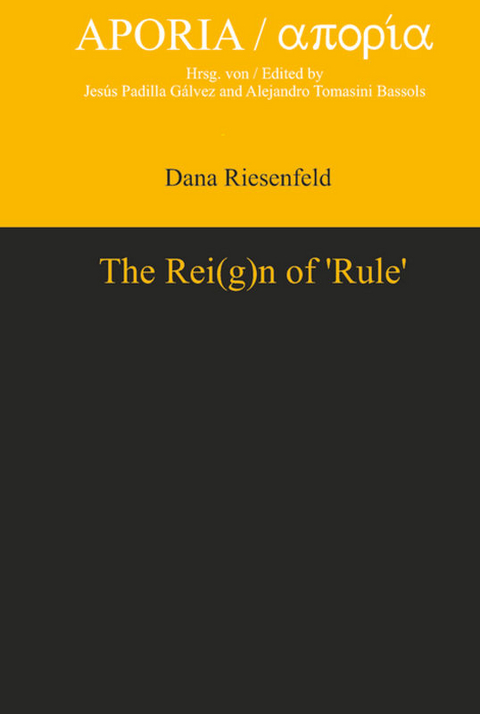
The Rei(g)n of ‘Rule’
Seiten
2010
De Gruyter (Verlag)
978-3-11-032157-9 (ISBN)
De Gruyter (Verlag)
978-3-11-032157-9 (ISBN)
Aiming to bridge the gap between analytical and continental philosophy, this peer-reviewed series presents innovative, cutting-edge contributions in contemporary philosophical inquiry, written in English or German. The series is a useful introduction to a variety of topics, aimed at readers interested in the concepts, methods, and historical developments of philosophy.
The Rei(g)n of Rule is a study of rules and their role in language. Rules have dominated the philosophical arena as a fundamental philosophical concept. Little progress, however, has been made in reaching an accepted definition of rules. This fact is not coincidental. The concept of rule is expected to perform various, at times conflicting, tasks. Analyzing key debates and rule related discussions in the philosophy of language I show that typically rules are perceived and defined either as norms or as conventions. As norms, rules perform the evaluative task of distinguishing between correct and incorrect actions. As conventions, rules describe how certain actions are actually undertaken. As normative and conventional requirements do not necessarily coincide, the concept of rule cannot simultaneously accommodate both. The impossibility to consistently define ‘rule’ has gone unnoticed by philosophers, and it is in this sense that ‘rule’ has also blocked philosophical attempts to explain language in terms of rules.
The Rei(g)n of Rule is a study of rules and their role in language. Rules have dominated the philosophical arena as a fundamental philosophical concept. Little progress, however, has been made in reaching an accepted definition of rules. This fact is not coincidental. The concept of rule is expected to perform various, at times conflicting, tasks. Analyzing key debates and rule related discussions in the philosophy of language I show that typically rules are perceived and defined either as norms or as conventions. As norms, rules perform the evaluative task of distinguishing between correct and incorrect actions. As conventions, rules describe how certain actions are actually undertaken. As normative and conventional requirements do not necessarily coincide, the concept of rule cannot simultaneously accommodate both. The impossibility to consistently define ‘rule’ has gone unnoticed by philosophers, and it is in this sense that ‘rule’ has also blocked philosophical attempts to explain language in terms of rules.
| Erscheint lt. Verlag | 17.9.2010 |
|---|---|
| Reihe/Serie | Aporia ; 2 |
| Verlagsort | Berlin/Boston |
| Sprache | englisch |
| Maße | 148 x 210 mm |
| Gewicht | 346 g |
| Themenwelt | Geisteswissenschaften ► Philosophie ► Geschichte der Philosophie |
| Geisteswissenschaften ► Philosophie ► Philosophie der Neuzeit | |
| Geisteswissenschaften ► Philosophie ► Sprachphilosophie | |
| Schlagworte | 20., 21. Jahrhundert • Concept • conflict • EALT54 • electronic books • History & Surveys • John Locke • language • Language and languages • Locke • LURAGHI/HUUMO • Partitives • Philosophy • Philosophy of Language • Requirement • Requirements • Review • Rules (Philosophy) • science and technology • Tradition |
| ISBN-10 | 3-11-032157-2 / 3110321572 |
| ISBN-13 | 978-3-11-032157-9 / 9783110321579 |
| Zustand | Neuware |
| Haben Sie eine Frage zum Produkt? |
Mehr entdecken
aus dem Bereich
aus dem Bereich
die kolonialen Wurzeln der französischen Theorie
Buch | Hardcover (2024)
Matthes & Seitz Berlin (Verlag)
28,00 €
oder Das Leben Montaignes in einer Frage und zwanzig Antworten
Buch | Softcover (2023)
C.H.Beck (Verlag)
18,00 €


